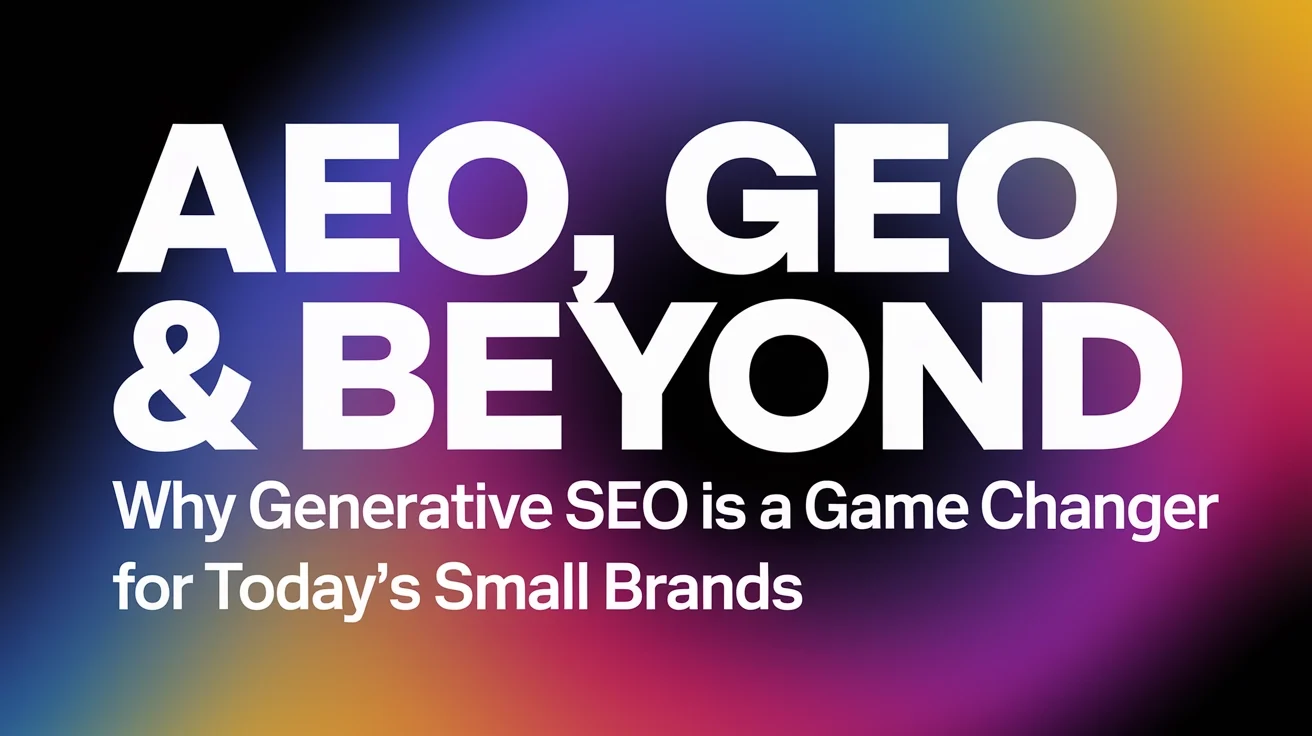The Search Revolution You Can't Afford to Miss
Remember when SEO was just about ranking on Google's first page? Those days are rapidly fading into digital history. We're witnessing nothing short of a revolution in how people find information online—and small brands that don't adapt quickly risk becoming invisible in this new landscape.
Welcome to the era of Generative SEO, where AI doesn't just index your content—it creates new content from it. This fundamental shift is redefining how brands connect with audiences, and it's happening faster than most business owners realize.
At Tefans Tactics, we've been tracking this evolution closely, and today we're breaking down why Generative SEO isn't just another buzzword—it's the new battlefield where small brands can actually gain ground against bigger competitors.
Decoding the New Alphabet: AEO, GEO, and Traditional SEO
Before diving deeper, let's clarify what these terms actually mean:
-
Traditional SEO (Search Engine Optimization): Optimizing your website to rank higher in search engine results pages (SERPs) for specific keywords.
-
AEO (Answer Engine Optimization): Structuring content to directly answer specific questions, optimized for voice search and featured snippets.
-
GEO (Generative Engine Optimization): Optimizing content so it can be effectively processed, interpreted, and regenerated by AI systems like ChatGPT, Claude, and Google's SGE (Search Generative Experience).
Traditional SEO focuses on getting users to click through to your website. AEO aims to position your content as the definitive answer to specific questions. But GEO? It's about ensuring your content becomes part of the AI's knowledge base—allowing it to generate new content that references your expertise, even when users never directly visit your site.

Why Small Brands Have a Unique Advantage in This New Era
For years, small brands have struggled to compete with enterprise-level SEO budgets and domain authority. The generative revolution is leveling that playing field in several crucial ways:
1. Authority Over Size
AI systems prioritize factual accuracy and expertise over domain authority. A small brand with deep, specialized knowledge can outperform larger competitors when AI systems recognize that expertise.
2. Agility in Adaptation
Small brands can pivot quickly to optimize for generative AI, while larger organizations often move slowly due to bureaucracy and legacy systems.
3. Content Specificity
Niche expertise—which small brands often possess—is highly valuable to generative AI systems seeking accurate, specialized information.
Seven Ways Generative SEO Changes the Game for Small Brands
1. Expanded Reach Beyond Traditional Search
When your content is optimized for generative AI, you're no longer limited to search engine visibility. Your expertise can be surfaced during AI-assisted research, content creation, and conversational search—contexts where traditional SEO wouldn't reach.
A small brand specializing in sustainable packaging, for example, might find its expertise cited in AI-generated responses about eco-friendly business practices, even when the user never specifically searched for that brand.
2. Enhanced User Experience Through Intent Fulfillment
Generative AI excels at understanding context and user intent. By optimizing for these systems, small brands can ensure their content addresses the why behind searches, not just the what.
This means potential customers receive more relevant, helpful information—building trust in your brand even before they've directly engaged with you.
3. First-Mover Competitive Advantage
We're still in the early days of generative AI adoption. Small brands that optimize now gain a significant head start while competitors remain focused solely on traditional SEO metrics.

4. Building Brand Authority Through AI Citation
When generative AI platforms synthesize information, they often identify and credit authoritative sources. By positioning your content as highly citable through proper entity optimization and structured data, your small brand builds credibility with every AI-generated response that references your expertise.
5. Accessing Deeper Audience Insights
Generative AI interactions provide nuanced data about user interests and pain points that go beyond traditional keyword research. Smart small brands use these insights to refine their content strategy and product offerings.
6. Future-Proofing Your Digital Presence
The shift toward AI-mediated information discovery is accelerating. Small brands that optimize for generative engines now are building digital resilience for a future where traditional search may play a diminished role.
7. Scaling Content Creation Without Scaling Costs
Perhaps most importantly for resource-constrained small brands, generative AI tools can help create high-quality, optimized content at scale—enabling you to compete with larger content operations without proportional budget increases.
Practical Implementation: How to Optimize for Generative AI
Transforming your approach to incorporate generative SEO doesn't require scrapping your existing strategy. Instead, consider these practical adjustments:
Structure Content for AI Comprehension
- Use clear headings and subheadings
- Include concise definitions of key concepts
- Organize information in logical hierarchies
- Implement proper schema markup
- Create comprehensive entity associations
Focus on Semantic Richness
Generative AI understands context and relationships between concepts. Content that thoroughly explores a topic with related terms, examples, and nuanced discussion performs better than keyword-stuffed content.
Embrace Conversational Formats
Question-and-answer sections, FAQs, and conversational explanations map well to how users interact with AI assistants. This format also increases your chances of being cited as an authoritative source.
Prioritize Factual Accuracy
AI systems increasingly verify information across sources. Ensuring your content contains accurate, verifiable information with proper citations enhances your credibility with these systems.

Enhance Entity Recognition
Make sure your brand, products, key personnel, and unique concepts are clearly defined as entities that AI can recognize and reference. This often involves strategic use of structured data, consistent naming, and clear associations with established entities.
Real-World Success: Small Brands Winning with Generative SEO
While specific metrics are still emerging, we're already seeing success patterns among early adopters:
A boutique financial advisor increased their client inquiries by 43% after restructuring their content to address common financial planning questions in a format that generative AI could easily process and cite.
An independent sustainable fashion brand saw a 27% increase in organic traffic after implementing entity-focused content that positioned them as authorities on ethical manufacturing practices—becoming a frequent citation in AI responses about sustainable fashion.
A specialized B2B software company reported that 22% of their new leads mentioned finding them through AI assistant recommendations, despite having previously struggled to rank for competitive keywords in traditional search.
The Path Forward: Integrating Generative SEO Into Your Strategy
As we guide our clients at Tefans Tactics, we recommend a balanced approach that doesn't abandon traditional SEO but progressively incorporates generative optimization:
- Audit your existing content for AI-readability and citation potential
- Identify your unique knowledge assets that AI systems would find valuable
- Restructure key content to enhance entity recognition and fact extraction
- Monitor AI outputs in your industry to identify citation patterns
- Create dedicated resources that specifically address common questions in your niche
Measuring Success in the Generative Era
Traditional SEO metrics like rankings and organic traffic remain relevant, but new metrics matter too:
- AI citation frequency
- Featured content in AI responses
- Conversational query visibility
- Entity recognition accuracy
- Content reusability across AI platforms
Conclusion: The Strategic Imperative for Small Brands
The generative AI revolution isn't slowing down—it's accelerating. For small brands, this represents perhaps the most significant opportunity in years to gain visibility without massive marketing budgets.
Those who optimize for generative AI now aren't just preparing for the future—they're actively shaping it, establishing themselves as authoritative voices that AI systems will continue to recognize and amplify.
The question isn't whether your small brand should embrace generative SEO, but how quickly you can implement it before your competitors do the same.
Ready to position your brand for success in the generative AI era? Let's connect to develop a customized generative SEO strategy that leverages your unique expertise and positions your brand as a trusted authority that both humans and AI systems recognize.




No responses yet